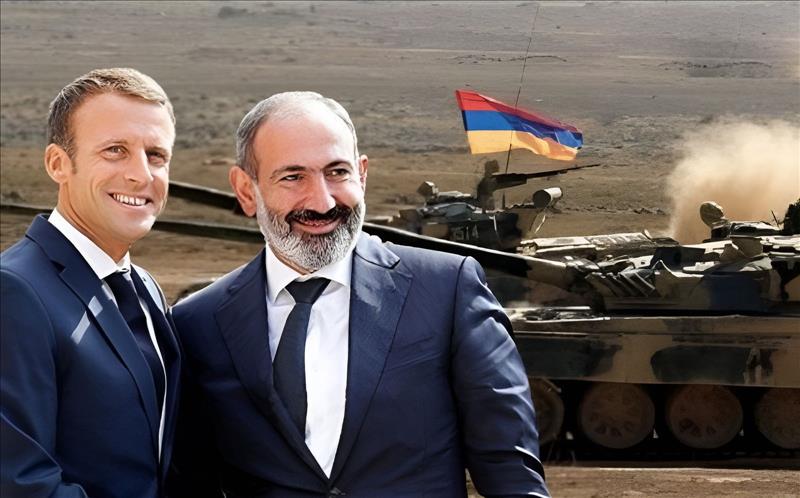
France's New Outpost: Macron's Colonial Script In Armenia
Macron's government does not stop its propaganda machine and expansionist policy regarding the South Caucasus for a moment. Under the guise of "Everything is for Armenia's sake", Yerevan has almost been turned into an outpost of Paris. The other day, the discussion between France's ambassador to Armenia, Olivier Decottignies, and Armenia's Defence Minister, Suren Papikyan, formed a strange scene. France appointed this pseudo-diplomat as prefect of Armenia and as Macron's eyes in the region, thus completing the process of France's colonisation of this territory with subsequent registration as an overseas department similar to French Guiana. The meeting between Decottignies and Armenia's Defence Minister highlights France's growing military engagement in the South Caucasus.
The discussions revolved around expanding defence cooperation, including reforms within the Armenian Armed Forces and cooperative programmes focused on enhancing Armenia's military capabilities. This meeting reflects France's ambition to cement its influence over Armenia, deepening what seems to be a strategy of neo-colonial entanglement.
France's Retreat Overseas, Armenia as a new pillar
First and foremost, France's expanding presence in Armenia mirrors a broader trend: the diminishing impact of French policies in former colonies across Africa and overseas territories. Recent events in Martinique, Guadeloupe and Kanaky, where anti-French sentiment has surged, illustrate this decline. The same is true in other parts of the Global South, where France's reputation as a colonial power has become a liability. With fewer reliable spheres of influence, Macron's administration is increasingly turning to Armenia as a safe bet to maintain geopolitical relevance, it resembles a form of soft colonialism-promising identity, prestige, and European belonging in exchange for obedience.
Armenia must also consider France's track record in fulfilling military promises. History has shown that France's support is often transactional, fluctuating with changing geopolitical priorities. His initial vows to stand firmly by Ukraine and support Zelenskyy's government have fallen short, exposing France's fluctuating commitment to allies. Macron's foreign policy often revolves around temporary interests rather than sustained partnerships, treating smaller nations, as nothing more than a disposable item in moments of shifting geopolitical priorities.
There is a stark warning here for Yerevan: Macron's gestures of friendship come with an expiration date. Armenia risks being abandoned just as quickly as France's support for Ukraine began to wane. The illusion of shared values and promises of European integration might collapse the moment Paris's strategic interests shift elsewhere.
Proxy war by proxy diplomacy
Macron's approach appears to extend beyond simple military support. France is not only preparing Armenia for conflict through arms deals and military agreements but also encouraging other European nations to join this agenda. By sending soldiers to Armenia under various guises and expanding its defence ties, France risks turning Armenia into a staging ground for conflicts with regional powers, including Türkiye and Russia.
"France continues its proxy war against Azerbaijan, over the South Caucasus country of Armenia, and by arming small countries, it prepares them for war against big powers." These actions betray France's underlying motive-to maintain its geopolitical presence by using Armenia as leverage against larger regional actors.
France's militarist policies in Armenia are not without consequences. Macron's aggressive stance has triggered a boomerang effect, damaging France's international reputation. The EU, often represented by France on international platforms, is also suffering from this fallout. Macron's insistence on obstructing peace between Armenia and Azerbaijan only serves to isolate France further, as regional actors view these moves as destabilising rather than constructive.
Arming Armenia and encouraging militarisation at a time when peace negotiations are still ongoing jeopardises not only Armenia's stability but also the broader regional balance. Macron's policies risk turning Armenia into a tool for foreign ambitions, pushing it closer to renewed conflict rather than sustainable peace.
Finally, the notion that France would remain committed to Armenia's defence in the event of heightened tensions seems optimistic at best. Armenia's overreliance on a European power with waning global influence could leave it vulnerable in the region. The meeting between Decottignies and Papikyan signals a deepening of military cooperation, but Armenia must be cautious not to fall into a strategic dependency on France. Macron's policy, cloaked in promises of support and reform, resembles a soft colonialism that lures allies with temporary benefits. Armenia may soon discover that it is nothing more than a pawn in France's geopolitical chessboard, discarded once it no longer serves Paris's interests.
For Armenia, the path forward lies in recalibrating its foreign policy. Prioritising sustainable regional partnerships over distant alliances with fluctuating powers like France will be critical. Otherwise, Armenia could risk its sovereignty in exchange for promises that may never materialise, finding itself isolated at a time when regional cooperation is more necessary than ever.
Legal Disclaimer:
MENAFN provides the
information “as is” without warranty of any kind. We do not accept
any responsibility or liability for the accuracy, content, images,
videos, licenses, completeness, legality, or reliability of the information
contained in this article. If you have any complaints or copyright
issues related to this article, kindly contact the provider above.

















Comments
No comment